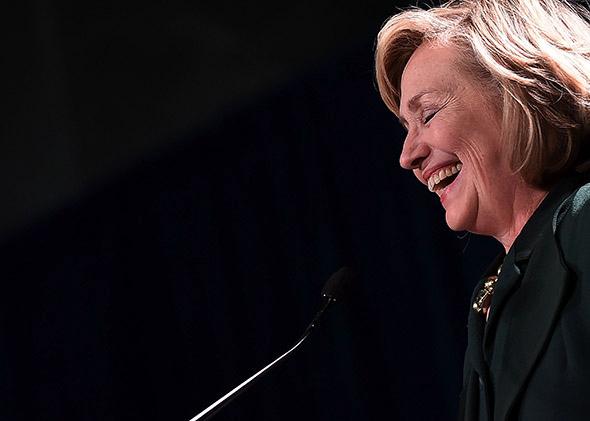The night was hardly over before Kentucky Sen. Rand Paul had his take on Tuesday’s election results. “I think this election was basically a repudiation of the president, but also Hillary Clinton,” he said. “The Democrat [in Kentucky] ran and wouldn’t admit that she voted for President Obama. She was very specific—‘I am a Clinton Democrat.’ ”
As political explanations go, this is unusually self-serving. Yes, the Clintons campaigned for Alison Lundergan Grimes, but there’s no evidence Kentuckians were voting against Clinton as much as they were voting against Obama. Paul’s take is purely a product of his aspirations; he’s running for the Republican presidential nomination, and he wants you to think that he’s the only one who can take on Hillary Clinton and win. Still, his comment raises a question: What does Tuesday mean for the unofficial—but very real—Clinton campaign?
Writing for Yahoo News, Andrew Romano says that the Republican win is a boon for the presumptive Democratic nominee. Because it’s “hard to imagine” soon-to-be Senate Majority Leader Mitch McConnell “will be able to control his party’s vehement Just Say No caucus.” In fact, there’s a great chance Washington will stay broken, allowing Clinton to “run as the antidote to D.C.’s dysfunction,” writes Romano.
On the other side, the National Review says this is nonsense. “Let’s get something clear: Watching your party get stomped like a narc at a biker rally in a midterm election is not something that helps a party’s presidential frontrunner,” writes Jim Geraghty for the conservative magazine. “America is not happy with Washington, and particularly furious with Obama and Democratic governance as a whole.”
Both takes get part of the picture right. The new Senate Republican majority is filled with Tea Party politicians—like Joni Ernst of Iowa and Tom Cotton of Arkansas—who have no interest in compromising or even working with the president, much less the Democratic minority. What’s more, the most extreme lawmakers—like Sen. Ted Cruz and the hard-right caucus of the House—likely feel vindicated. After two years of obstruction—including a government shutdown and a debt ceiling standoff—they won a huge midterm victory. Why change course? What’s the incentive?
In which case, the antics of an irresponsible Republican Congress will burden the eventual Republican presidential nominee, which only helps a Clinton candidacy. At the same time, the Democratic Party is in utter disrepair. Some progressives have comforted themselves by noting the popularity of Democratic ideas: Otherwise conservative states have raised the minimum wage, legalized marijuana, and protected abortion rights from draconian “personhood” laws. But this only highlights the problem with the Democratic brand, which is so unpopular it weighs down candidates who push otherwise popular proposals.
The question for Hillary Clinton’s campaign is this: Will voters see her as a singular figure—Hillary—standing against an unpopular Republican Party, or will they see her as just another Democrat against just another Republican? If it’s the former, then Tuesday doesn’t mean much for her prospective candidacy; voters will see her as Clinton first and a Democrat second, and may even see her ideas as Clinton ideas and not Democratic ones, which could help if she tries to expand the national issue space to include things like universal child care.
If it’s the latter, however, then Team Clinton has a new challenge: to turn the Democratic brand into something worth supporting in 2016. But even that comes with the important caveat that presidential candidates have done just fine following a bad midterm year and have failed after a good one. George H.W. Bush won the election after the Republican failure of 1986—the closest analogue to Hillary Clinton’s situation—and Al Gore lost it after the Democratic success of 1998.
I should say that there’s a third option in all of this: that Tuesday didn’t matter at all, and in a way that has nothing to do with Clinton’s persona. Put simply, there’s a good chance that 2014—like 2010—was driven by the demographics of American politics, in which Republican voters dominate midterm elections, and Democratic voters dominate presidential years. In which case, Clinton doesn’t have to worry about 2016 since she won’t be speaking to the people who elected a Republican Congress; she’ll be speaking to the people who twice elected Barack Obama. And that is a good position to be in.
